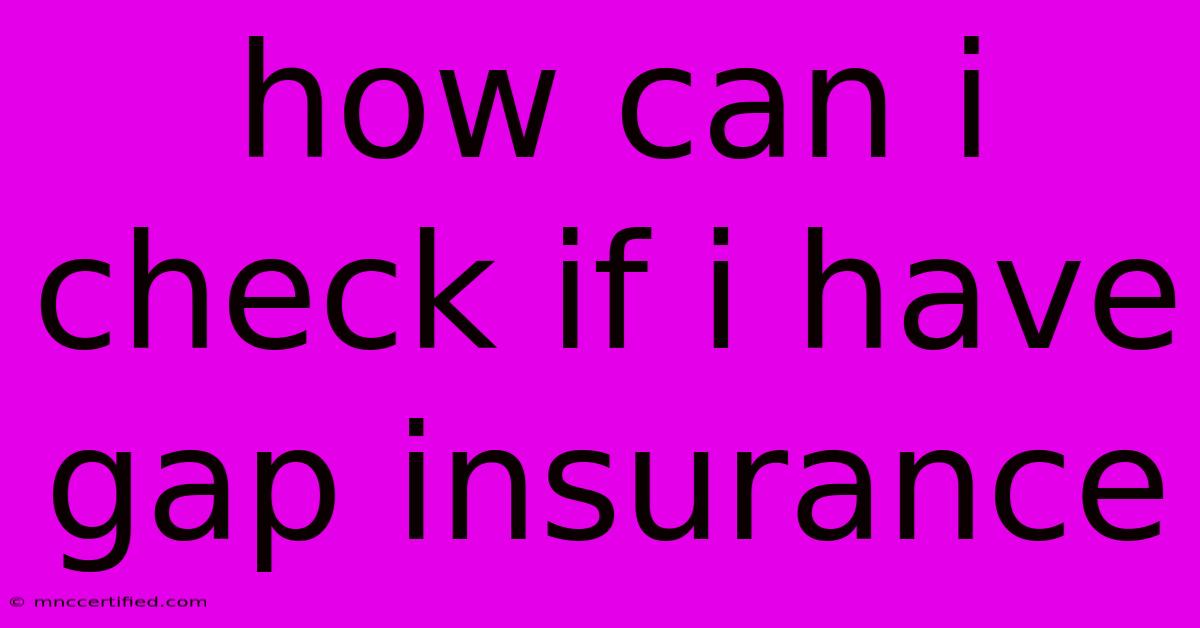How Can I Check If I Have Gap Insurance

Table of Contents
How to Check if You Have Gap Insurance: A Quick Guide
Have you ever thought about what would happen if your car was totaled in an accident? You might be covered by your car insurance, but what if the payout doesn't cover the full amount you owe on your loan? This is where gap insurance comes in.
Gap insurance can be a lifesaver in such situations, covering the difference between your car's actual cash value (ACV) and the outstanding loan balance. But how do you know if you have gap insurance?
Here's a breakdown of the most common ways to check:
1. Review Your Car Insurance Policy Documents
The first and most straightforward way to check if you have gap insurance is by reviewing your car insurance policy documents. Look for a section that mentions "gap insurance" or "loan/lease payoff coverage." If it's included, you'll find details like the coverage amount and any applicable conditions.
2. Contact Your Insurance Agent or Company
If you're unsure about your policy details or can't locate the relevant information, don't hesitate to contact your insurance agent or company. They can confirm whether you have gap insurance and provide any further details you require.
3. Check Your Loan or Lease Agreement
If you financed your car through a lender, check your loan or lease agreement for mention of gap insurance. Some lenders automatically include gap insurance in their financing packages, while others may offer it as an optional add-on.
4. Review Your Credit Card Statement
Some credit card companies offer gap insurance as a perk of their rewards programs. Look at your recent credit card statements or check your cardholder agreement to see if you're covered.
5. Utilize Online Tools
Several online tools and calculators can help you determine if you have gap insurance or estimate the potential coverage amount. These tools often require you to input details about your car, loan, and insurance policy.
What if You Don't Have Gap Insurance?
If you discover you don't have gap insurance and feel it's necessary, contact your insurance agent or company to discuss adding it to your policy. They can provide you with information about available options, coverage limits, and costs.
Gap Insurance: A Crucial Investment for Many
Gap insurance can be a valuable investment for many drivers, particularly those who:
- Have financed their car for a long period: As your car depreciates, the gap between the ACV and your loan balance widens, making gap insurance more beneficial.
- Have taken out a large loan: A significant loan balance increases the risk of facing a substantial financial burden if your car is totaled.
- Drive a new or high-value vehicle: Newer cars tend to depreciate more rapidly, making gap insurance a good idea.
Remember, it's always better to be prepared. Checking your insurance policy documents or contacting your insurance agent is the best way to ensure you have the protection you need in case of an unforeseen event.

Thank you for visiting our website wich cover about How Can I Check If I Have Gap Insurance. We hope the information provided has been useful to you. Feel free to contact us if you have any questions or need further assistance. See you next time and dont miss to bookmark.
Featured Posts
-
Zach Bryan Releases This Worlds A Giant
Nov 08, 2024
-
Watch Bengals Vs Ravens Todays Game Info
Nov 08, 2024
-
Starbucks Red Cup Day 2023 Date Deals And More
Nov 08, 2024
-
Outer Banks Season 4 Character Name Alive Or Dead
Nov 08, 2024
-
Bengals Vs Ravens Todays Game Schedule
Nov 08, 2024